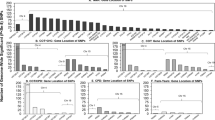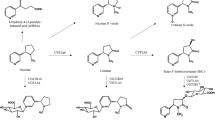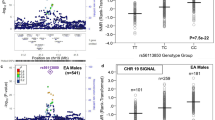Abstract
CYP2A6 is the main enzyme that catalyzes nicotine into cotinine. Interindividual differences in nicotine metabolism result at least partially from polymorphic variation of CYP2A6 gene. In this study, we evaluated the influence of CYP2A6 polymorphisms on clinical phenotypes of smoking, such as smoking habit and withdrawal symptoms. Japanese smokers (n=107) were genotyped for CYP2A6*1, *4 and *9. Consistent with the previous reports, CYP2A6 genotypes have a tendency to correlate with the number of cigarettes per day and with daily intake of nicotine. Interestingly, CYP2A6 high-activity group (CYP2A6*1/*1, *1/*9, *1/*4, *9/*9) smoked the first cigarette of the day earlier than low-activity group (CYP2A6*4/*9, *4/*4), indicating more remarkable nicotine dependence. Furthermore, nicotine withdrawal symptoms were more serious in smoking cessation in CYP2A6 high-activity group. Collectively, CYP2A6 genotypes are related with nicotine dependence, influencing smoking habits and withdrawal symptoms in quitting smoking. It is proposed that individualized smoking cessation program could be designed based on CYP2A6 genotypes.
This is a preview of subscription content, access via your institution
Access options
Subscribe to this journal
Receive 6 print issues and online access
$259.00 per year
only $43.17 per issue
Buy this article
- Purchase on Springer Link
- Instant access to full article PDF
Prices may be subject to local taxes which are calculated during checkout




Similar content being viewed by others
References
Benowitz NL, Jacob III P . Metabolism of nicotine to cotinine studied by a dual stable isotope method. Clin Pharmacol Ther 1994; 56: 483–493.
Nunoya K, Yokoi T, Kimura K, Inoue K, Kodama T, Funayama et al. A new deleted allele in the human cytochrome P450 2A6 (CYP2A6) gene found in individuals showing poor metabolic capacity to coumarin and (+)-cis-3,5-dimethyl-2-(3-pyridyl)thiazolidin-4-one hydrochloride (SM-12502). Pharmacogenetics 1998; 8: 239–249.
Nunoya KI, Yokoi T, Kimura K, Kainuma T, Satoh K, Kinoshita M et al. A new CYP2A6 gene deletion responsible for the in vivo polymorphic metabolism of (+)-cis-3,5-dimethyl-2-(3-pyridyl)thiazolidin-4-one hydrochloride in humans. J Pharmacol Exp Ther 1999; 289: 437–442.
Pitarque M, von Richter O, Oke B, Berkkan H, Oscarson M, Ingelman-Sundberg M . Identification of a single nucleotide polymorphism in the TATA box of the CYP2A6 gene: impairment of its promoter activity. Biochem Biophys Res Commun 2001; 284: 455–460.
Yoshida R, Nakajima M, Nishimura K, Tokudome S, Kwon JT, Yokoi T . Effects of polymorphism in promoter region of human CYP2A6 gene (CYP2A6*9) on expression level of messenger ribonucleic acid and enzymatic activity in vivo and in vitro. Clin Pharmacol Ther 2003; 74: 69–76.
Kiyotani K, Yamazaki H, Fujieda M, Iwano S, Matsumura K, Satarug S et al. Decreased coumarin 7-hydroxylase activities and CYP2A6 expression levels in humans caused by genetic polymorphism in CYP2A6 promoter region (CYP2A6*9). Pharmacogenetics 2003; 13: 689–695.
Jarvik ME, Madsen DC, Olmstead RE, Iwamoto-Schaap PN, Elins JL, Benowitz NL . Nicotine blood levels and subjective craving for cigarettes. Pharmacol Biochem Behav 2000; 66: 553–558.
Fujieda M, Yamazaki H, Saito T, Kiyotani K, Gyamfi MA, Sakurai M et al. Evaluation of CYP2A6 genetic polymorphisms as determinants of smoking behavior and tobacco-related lung cancer risk in male Japanese smokers. Carcinogenesis 2004; 25: 2451–2458.
Schoedel KA, Hoffmann EB, Rao Y, Sellers EM, Tyndale RF . Ethnic variation in CYP2A6 and association of genetically slow nicotine metabolism and smoking in adult Caucasians. Pharmacogenetics 2004; 14: 615–626.
Minematsu N, Nakamura H, Iwata M, Tateno H, Nakajima T, Takahashi S et al. Association of CYP2A6 deletion polymorphism with smoking habit and development of pulmonary emphysema. Thorax 2003; 58: 623–628.
Ando M, Hamajima N, Ariyoshi N, Kamataki T, Matsuo K, Ohno Y . Association of CYP2A6 gene deletion with cigarette smoking status in Japanese adults. J Epidemiol 2003; 13: 176–181.
Yang M, Kunugita N, Kitagawa K, Tateno H, Nakajima T, Takahashi S et al. Individual differences in urinary cotinine levels in Japanese smokers: relation to genetic polymorphism of drug-metabolizing enzymes. Cancer Epidemiol Biomarkers Prev 2001; 10: 589–593.
Zhang X, Amemo K, Ameno S, Iwahashi K, Kinoshita H, Kubota T et al. Lack of association between smoking and CYP2A6 gene polymorphisms in a Japanese population. Nihon Arukoru Yakubutsu Igakkai Zasshi 2001; 36: 486–490.
Tan W, Chen GF, Xing DY, Song CY, Kadlubar FF, Lin DX . Frequency of CYP2A6 gene deletion and its relation to risk of lung and esophageal cancer in the Chinese population. Int J Cancer 2001; 95: 96–101.
Loriot MA, Rebuissou S, Oscarson M, Cenee S, Miyamoto M, Ariyoshi N et al. Genetic polymorphisms of cytochrome P450 2A6 in a case–control study on lung cancer in a French population. Pharmacogenetics 2001; 11: 39–44.
John U, Meyer C, Schumann A, Hapke U, Rumpf HJ, Adam C et al. A short form of the Fagerstrom Test for Nicotine Dependence and the Heaviness of Smoking Index in two adult population samples. Addict Behav 2004; 29: 1207–1212.
Dani JA, Heinemann S et al. Molecular and cellular aspects of nicotine abuse. Neuron 1996; 16: 905–908.
Ariyoshi N, Takahashi Y, Miyamoto M et al. Structural characterization of a new variant of the CYP2A6 gene (CYP2A6*1B) apparently diagnosed as heterozygotes of CYP2A6*1A and CYP2A6*4C. Pharmacogenetics 2000; 10: 687–693.
Acknowledgements
We thank Ms Y Murao for her excellent secretary work. This work is supported by a Grant-in-Aid for Scientific Research from Ministry of Education, Science, Sports and Culture of Japan.
Author information
Authors and Affiliations
Corresponding author
Rights and permissions
About this article
Cite this article
Kubota, T., Nakajima-Taniguchi, C., Fukuda, T. et al. CYP2A6 polymorphisms are associated with nicotine dependence and influence withdrawal symptoms in smoking cessation. Pharmacogenomics J 6, 115–119 (2006). https://doi.org/10.1038/sj.tpj.6500348
Received:
Revised:
Accepted:
Published:
Issue Date:
DOI: https://doi.org/10.1038/sj.tpj.6500348
Keywords
This article is cited by
-
Persistent Disparities in Smoking Rates Among PLWH Compared to the General Population in Philadelphia, 2009–2014
AIDS and Behavior (2021)
-
Bidirectional Associations among Nicotine and Tobacco Smoke, NeuroHIV, and Antiretroviral Therapy
Journal of Neuroimmune Pharmacology (2020)
-
N-acetyltransferase 1 polymorphism increases cotinine levels in Caucasian children exposed to secondhand smoke: the CCAAPS birth cohort
The Pharmacogenomics Journal (2015)
-
Biomarkers of Response to Smoking Cessation Pharmacotherapies: Progress to Date
CNS Drugs (2015)
-
Genetic influence of dopamine receptor, dopamine transporter, and nicotine metabolism on smoking cessation and nicotine dependence in a Japanese population
BMC Genetics (2014)



